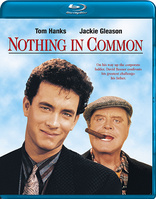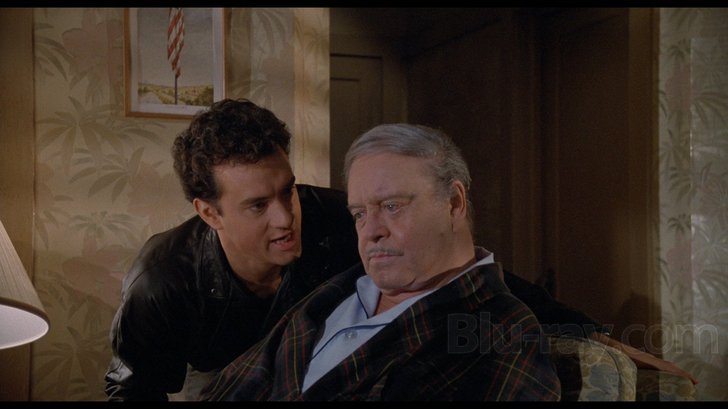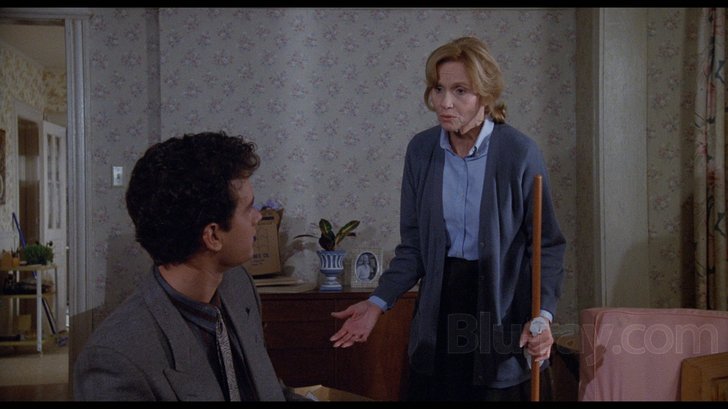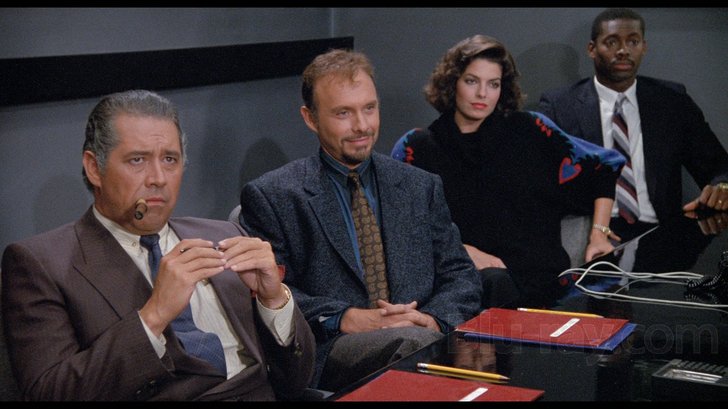Nothing in Common Blu-ray Movie
HomeNothing in Common Blu-ray Movie 
Image Entertainment | 1986 | 119 min | Rated PG | Jan 31, 2012
Movie rating
6.6 | / 10 |
Blu-ray rating
| Users | 4.0 | |
| Reviewer | 4.0 | |
| Overall | 4.0 |
Overview
Nothing in Common (1986)
David Basner fled an unhappy home for a successful life in advertising, but he has remained a perpetual child. Then one day his father calls to announce that his mother has left him. Suddenly David finds himself pulled back into his parents' lives, only now it's David who has to be the grown-up. And these responsibilities couldn't come at a worse time, as David struggles to land the most important deal of his career.
Starring: Tom Hanks, Jackie Gleason, Eva Marie Saint, Sela Ward, Bess ArmstrongDirector: Garry Marshall
| Romance | 100% |
| Comedy | 41% |
| Drama | Insignificant |
Specifications
Video
Video codec: MPEG-4 AVC
Video resolution: 1080p
Aspect ratio: 1.85:1
Original aspect ratio: 1.85:1
Audio
English: LPCM 2.0 (48kHz, 16-bit)
Subtitles
English SDH, Spanish
Discs
25GB Blu-ray Disc
Single disc (1 BD)
Playback
Region A (locked)
Review
Rating summary
| Movie | 4.5 | |
| Video | 4.0 | |
| Audio | 3.5 | |
| Extras | 0.0 | |
| Overall | 4.0 |
Nothing in Common Blu-ray Movie Review
Not Far from the Tree
Reviewed by Michael Reuben January 20, 2012Nothing in Common should be better known than it is. Among other things, it was Jackie Gleason's last film, and the Great One (as he was nicknamed, supposedly by Orson Welles) ended his career with a flourish. Best remembered for the comedic gifts that blazed in The Honeymooners and various incarnations of The Jackie Gleason Show, the Brooklyn native was also a superb dramatic actor, as anyone who's ever seen his Minnesota Fats in The Hustler can attest. (Here's hoping Columbia soon releases Requiem for a Heavyweight, which contains another great Gleason performance.) In his portrayal of Max Basner, a small-time salesman and a failed husband and father surveying the wreckage of his life, Gleason deployed an entire career's worth of acting technique and a lifetime's experience as a human being to create an indelible portrait of rage, frustration and regret. Gleason was well-matched by Tom Hanks, a future movie star who was just then making the turn from comedy to drama. Looking back and knowing what we know now, it's easy to say, "Well, of course!" But at the time, Hanks had done none of the work that would win him accolades; Big, his first Oscar nomination, was two years in the future, and no one knew Hanks as anything more than a light comedic actor who could be pleasant in fluff like Splash and Bachelor Party. David Basner, the lead character of Nothing in Common, begins in that happy-go-lucky vein, but very quickly finds himself dragged, kicking and screaming, into darker territory. Without an actor who could make that transition convincing, the film wouldn't have worked. That Hanks pulled it off opposite as formidable a presence as Gleason signaled a turning point in his career—and I say this with the confidence of someone who saw the film when it first appeared and knew I was seeing something unusual. (I've seen it at least a dozen times in the twenty-five years since then.) The director of this odd couple was Garry Marshall, who used to be able to make movies without smothering them in sentiment (though Nothing in Common has its share) and without tying them to a national holiday (New Year's Eve being the latest victim). Marshall made the film at the beginning of his feature career, when he was still working within the richly diverse subject of family relations, which is where he'd enjoyed success as a TV producer. His most profitable films may have been about romance, but his best have been about troubled family relationships.

David Basner (Hanks) is a successful ad man with the Chicago firm of Boyle, Gargas & Lionel, where he's just been promoted to creative director and aspires to become a partner. He's about thirty, witty, good-looking, unattached, makes plenty of money, drives a jeep and has no trouble talking pretty women into bed. David is also, by his own admission, "childish, immature and selfish". But as he says to his friend and former high school flame, Donna (Bess Armstrong): "Do you know how much money I make for thinking this way?" Donna, a drama teacher at Northwestern University, has known David too long to have any illusions about him. "Look closely, girls", she says, when introducing him to her students. "This is what you want to avoid later in life." Donna knows where David started and what he ran away from. It's these conflicted family relationships that come crashing into David's bachelor apartment one night when he's in bed with his latest conquest, courtesy of a phone call from his father, Max (Gleason), announcing that his mother, Lorraine (Eva Marie Saint), has walked out after thirty-plus years of marriage. David has maintained minimal contact with his parents since moving away ten years earlier. Cards, flowers, phone calls and occasional brief visits at Christmas and birthdays have been the extent of his involvement. His fantasy, as he tells Donna, is to build a mansion and have the parents visit once to admire it before going off quietly to die. Now, though, David finds himself pulled back almost daily into the lives of both Max and Lorraine as he makes the same painful discovery shared by many adult children of aging parents: that they need his help, especially now that each one is on their own. Max is especially needy without Lorraine to wait on him. (He can't even find the ketchup.) While Lorraine slowly begins to blossom with David's help (new clothes, new friends, her first job), Max rapidly deteriorates. A creature of habit, he can't adjust to changed circumstances, either at home or in the children's clothing business where he's been a salesmen all his life. Nor can he cope with his own physical deterioration; his refusal to wear glasses causes a traffic accident, and his refusal to seek medical attention leads to more serious problems. And through it all, Max seethes with envy at the son who can still do all the things—competing in business, chasing women—that Max no longer can. When Max is fired from his job and has to come to David's office to seek financial support, the fury and humiliation ooze from every pore. (Gleason is scarily convincing in these scenes.) For David, the worst part isn't the logistical and financial demands. It's the emotional baggage he thought he'd permanently sealed away in a storeroom under lock and key. Couples who split typically vent at their children, and Max and Lorraine are no exception. David's renewed and intensive contact with his parents gives him an opportunity (and it's one he never wanted) for an adult's understanding of family issues that, as a child, he could only sense at an intuitive level. "You were a moody little shit!" Max tells him, but as his parents come clean about the distance that's always prevailed between them, it's not hard to understand why. When David and his father finally confront each other, David's most damning accusation is that he grew up in a boarding house. Max, who doesn't have many options for a counterattack against his handsome and successful son, can only come up with: "Your best friend is your dick!", which, as David immediately points out, makes them very much alike—and that may be the single most unsettling thing David learns from the whole experience. As if all this weren't enough stress, David is simultaneously trying to land the most important account of his career, Colonial Airlines, a lucrative and prestigious client that his friend and mentor, Charlie Gargas (Hector Elizondo, a regular in Marshall's films), has made clear will be his ticket to a partnership. The owner and CEO, Alexander Woolridge (Barry Corbin), is a tyrannical eccentric who uses a salad fork for every course of the meal, hunts ducks, raises horses, and generally behaves like a feudal lord in cowboy boots. His daughter, Cheryl Ann (Sela Ward), is his media director, and it's she who makes David one of her conquests. Once upon a time, they would have been a perfect match, both driven, self-centered and wary of commitment. But David's unexpected encounter with his past has him looking for something different, which is why he shows up on Donna's doorstep late at night. This infuriates Donna but actually intrigues her boyfriend, Robert (Mark von Holstein), a budding shrink who observes that David has "unresolved issues"—which only serves to inflame Donna further. There's a lot of comedy in the film, much of it courtesy of the ad agency crew (which includes Dan Castellaneta, the future voice of Homer Simpson) and Barry Corbin's deliberately exaggerated portrayal of a difficult client. In addition, Hanks manages the difficult trick of making you laugh at behavior by David Basner that would be obnoxious in most people. (Even his meltdowns are funny.) Max Basner probably had the same gift as a young man, and it carried him a long way. But underneath the Good Time Charlie, there wasn't much substance, and Jackie Gleason's Max is a frank portrait of the fear and self-loathing of a man who looks back over his life, doesn't like what he sees and lashes out at everyone around him. When his long-suffering wife makes one last attempt to reach him (Max is in the hospital by this time), the conversation ends badly. Nothing in Common holds up, because each actor portraying a member of the Basner family—Gleason, Hanks and, with much less screen time, Eva Marie Saint—creates a complete, nuanced, fully rounded personality who reveals new facets every time I see the film. My own family is nothing like the Basners, but as we've all aged, I've found aspects of our lives reflected in the film that, when I first saw it, were only theoretical. Good films and great performances are like that sometimes. They hold back some of their treasures until you're ready for them.
Nothing in Common Blu-ray Movie, Video Quality 

The late John A. Alonzo (Chinatown and Scarface) shot Nothing in Common, which made extensive use of locations in and around downtown Chicago and Northwestern University, and Alonzo successfully captured a realistic sense of these locations (many of which I know) without making them look like they were shot for a documentary. He also did full justice to the atrocious clothing worn by the ad and clothing industry people, who are walking cautionary tales for the excesses of Eighties fashion. It's these fashions that are the only point where Image's 1080p, AVC-encoded Blu-ray meets its match. A few of the patterns, especially one particularly busy jacket of David Basner's with colors woven into it that are almost certainly not found in nature, generate minor aliasing and video noise. It's startling to encounter this phenomenon on Blu-ray, because it takes a truly outrageous pattern to exceed the limits of 1080p resolution, but that's the Eighties for you. With this exception (and it's a minor flaw), the Blu-ray handles Alonzo's images with aplomb, resolving fine detail in actor's expressions, indoor and outdoor scenery and the various bad hairpieces that Hector Elizondo's Charlie tries and can never get comfortable with. Black levels and contrast are correctly set, and colors appear natural and neither over- nor under-saturated. As is typically the case with Image/Sony titles, there is no indication of high frequency filtering or artificial sharpening, nor did I spot any compression artifacts. One additional note: Alonzo was well-known for his "minimalist" style of lighting, which means that in the film's darker scenes (e.g., in Max Basner's apartment) the image is softer and the film grain more evident. But even though this pioneering DP was an early proponent of hi-def video, he also understood that film grain was a friend, not an enemy, and he knew how to use it to capture detail. Grainophobes may complain about this image, but it's faithful and first-rate.
Nothing in Common Blu-ray Movie, Audio Quality 

The original mono soundtrack is presented as PCM 2.0. When played through a good set of stereo speakers in "direct" mode, the track should provide a wide soundstage, much like a typical theatrical array. When played through a matrix decoder, the two identical channels should collapse to the center speaker of a typical home theater array. Either way, the dialogue is very clear, and the musical track has surprisingly broad dynamic range and fidelity, though one might have wished for somewhat deeper bass extension. Director Marshall was already beginning to use pop tunes to comment on the action (a technique that would work especially well in his most successful film, Pretty Woman), and the soundtrack for Nothing in Common makes effective use of songs by Christopher Cross, Carly Simon and Richard Marx, among others. The longing title song by The Thompson Twins is heard briefly in the local bar where David Basner and his colleagues hang out after work and plays again over the closing credits. The film's underscoring was provided by Patrick Leonard, another key Eighties figure who was Madonna's preferred producer in the first phase of her career.
Nothing in Common Blu-ray Movie, Special Features and Extras 

Sony's 2002 DVD release of Nothing in Common contained the film's trailer and no other extras. In what is becoming an unfortunate trend for Image's Sony catalog releases, the Blu-ray omits that scant supplement.
Nothing in Common Blu-ray Movie, Overall Score and Recommendation 

After Nothing in Common, Marshall's films took a distinct turn toward fairy tales and sentimentality. The results were sometimes phenomenally successful (not just Pretty Woman, but also The Princess Diaries and Beaches) and even entertaining, but the escapist element took over, eventually crowding out all semblance of recognizable humanity. The Marshall who made Nothing in Common is nowhere to be found in the holiday anthologies being cranked out by today's purveyor of cinematic junk food. Nothing in Common has memorable comic bits, but it's filled with sadness for things that have been broken and time that's been lost. Still, the saddest thing of all is that Marshall never again made a film of this calibre. Highly recommended.
Similar titles
Similar titles you might also like

Risky Business 4K
1983

About Last Night...
1986

Morning Glory
2010

When Harry Met Sally...
30th Anniversary Edition
1989

Love & Other Drugs
2010

(500) Days of Summer
2009

Some Girls
1988

Working Girl
1988

Kissing a Fool
1998

Say Anything...
20th Anniversary Edition
1989

Cocktail
1988

Baby Boom
1987

California Suite
1978

The Break-Up
2006

Love Me or Leave Me
Warner Archive Collection
1955

The Rewrite
2014

Begin Again
2013

Two for the Road
Limited Edition to 3000
1967

Twentieth Century
1934

Vicky Cristina Barcelona
2008